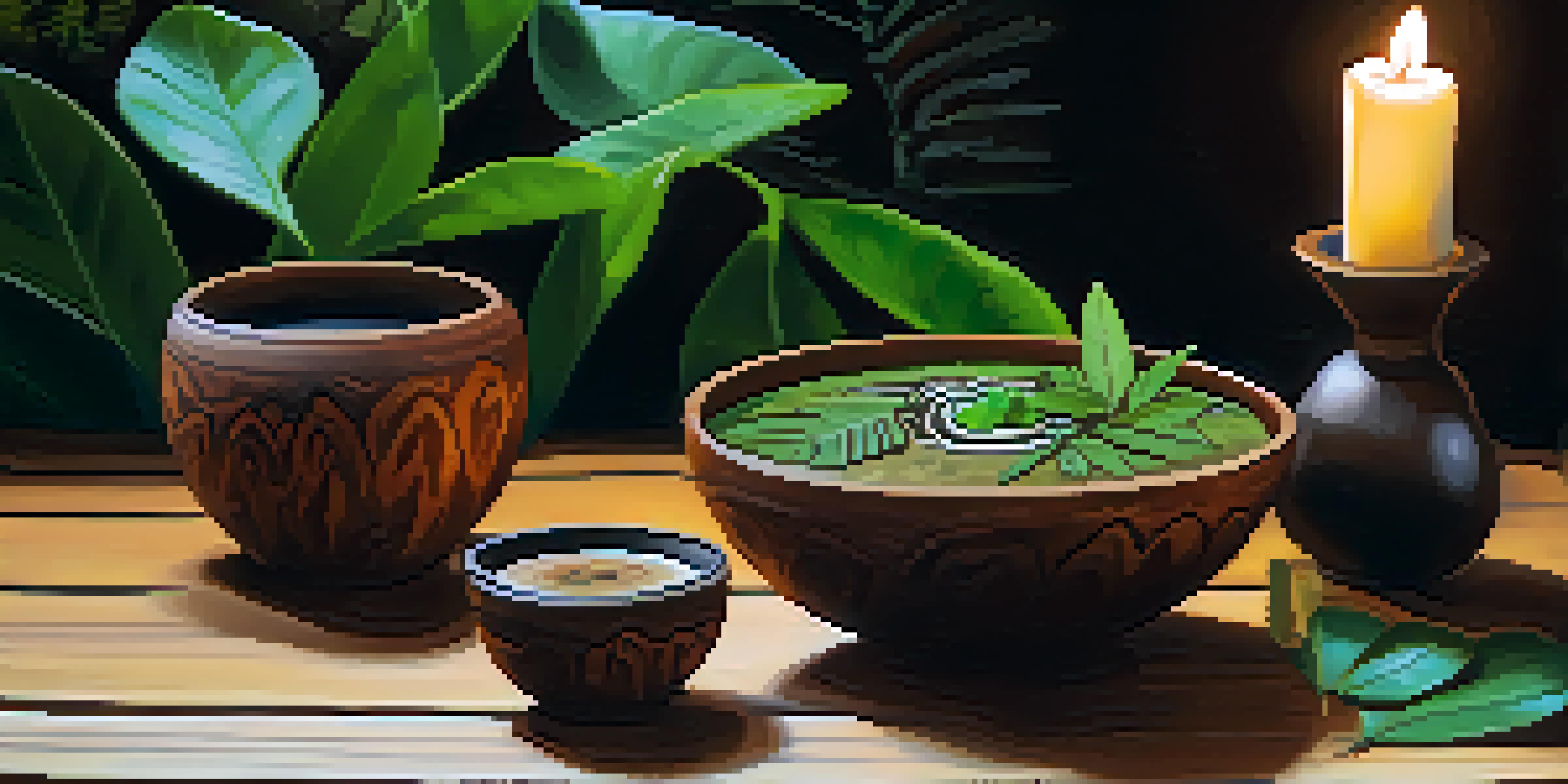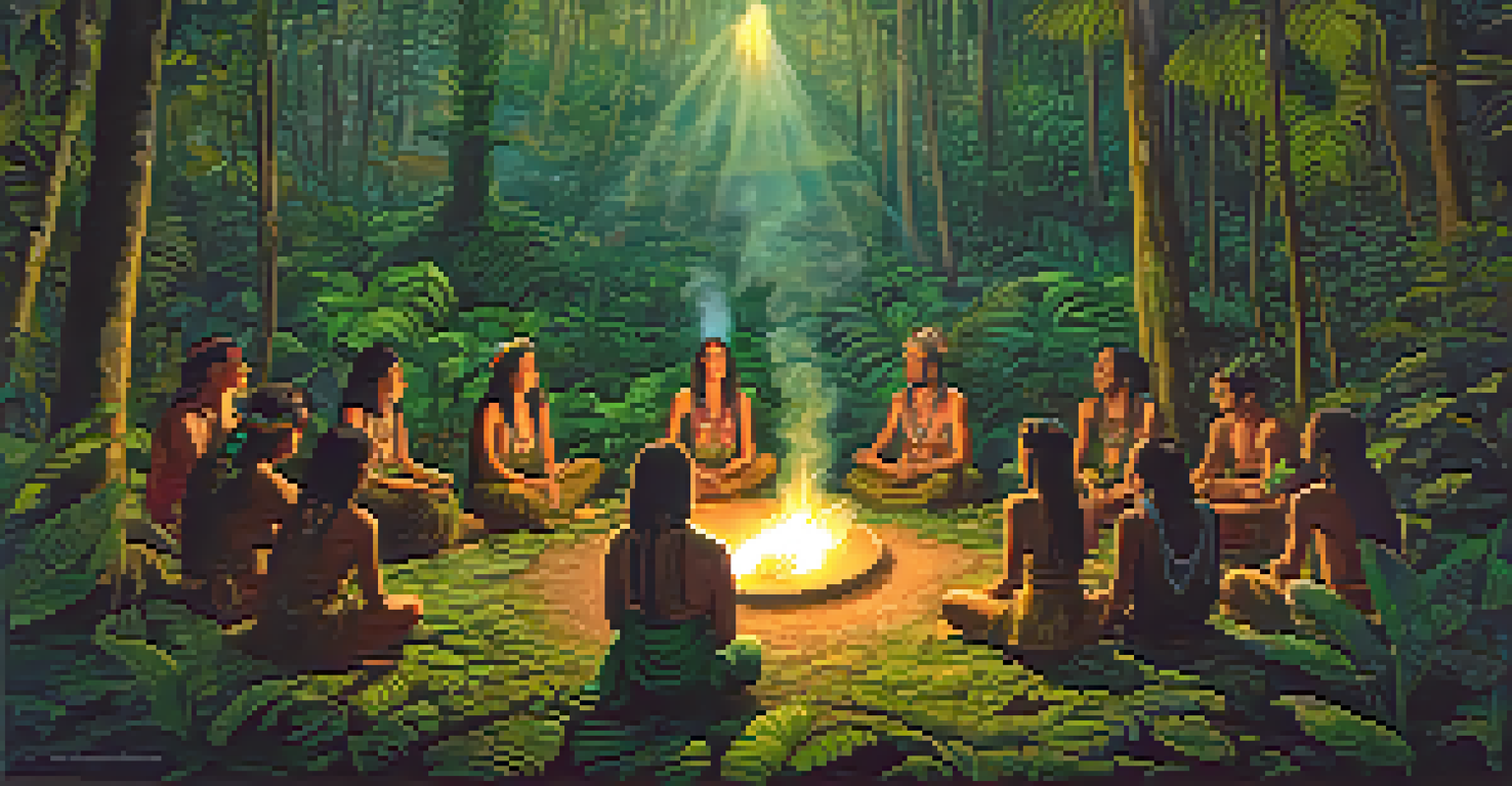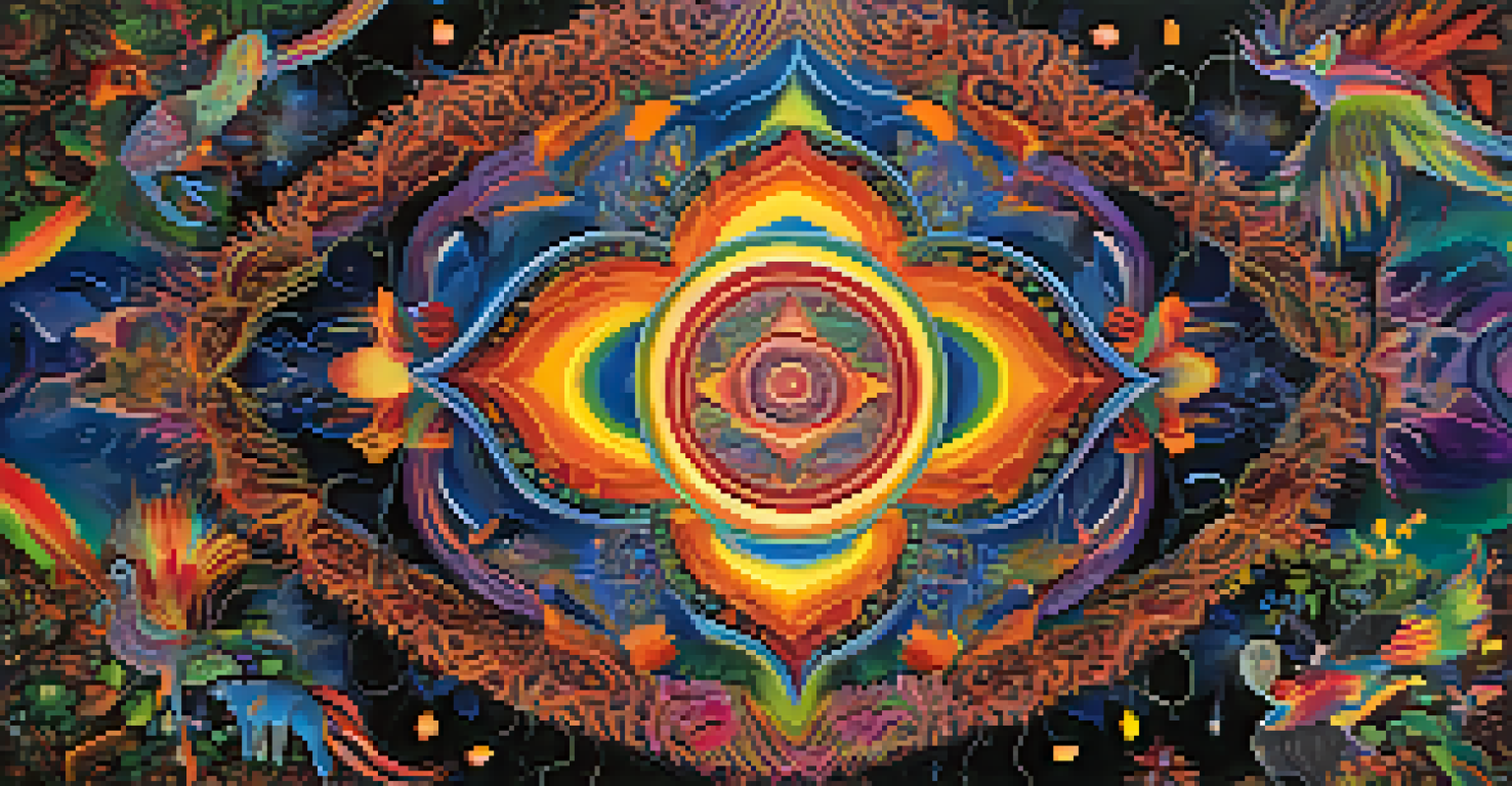The Cultural Significance of Ayahuasca in Amazonian Tribes

Understanding Ayahuasca: More than a Plant Medicine
Ayahuasca, a brew made from the Banisteriopsis caapi vine and other plants, is revered in Amazonian cultures for its profound psychoactive properties. This sacred beverage is not just a tool for healing; it represents a deep connection to the spiritual world. For many tribes, it serves as a gateway to understanding one’s place in the universe and the interconnectedness of life.
The world is full of magic things, patiently waiting for our senses to grow sharper.
The preparation and consumption of Ayahuasca are steeped in tradition, often involving rituals led by experienced shamans. These shamans, viewed as spiritual guides, facilitate journeys that help participants confront personal challenges and gain insights. Thus, Ayahuasca is integral to the cultural fabric, providing both a means of healing and a way to foster community bonds.
Moreover, Ayahuasca is intertwined with the mythology and storytelling of numerous tribes. Tales of its origins and the spirit world enrich the experience, making it not only a physical journey but also a narrative one. This blend of medicine and myth underscores the brew’s cultural significance, marking it as a vital aspect of Amazonian identity.
Ayahuasca Ceremonies: Rituals of Transformation
Ceremonies surrounding Ayahuasca consumption are profound rituals that symbolize transformation and renewal. Participants often gather in a circle, creating a safe space where they can share their intentions and express their vulnerabilities. This communal aspect reinforces the idea that healing is a shared journey, not an isolated experience.

During the ceremony, the shaman guides participants through the process, using songs and chants known as icaros to invoke spirits and create a sacred atmosphere. The rhythm of these songs helps facilitate the journey, often leading to emotional release and spiritual revelations. This ritualistic approach highlights the importance of tradition in the healing process.
Ayahuasca: A Cultural Pillar
Ayahuasca serves as a vital aspect of Amazonian identity, intertwining healing practices with spiritual and communal traditions.
Post-ceremony, sharing experiences among participants fosters a sense of community and belonging. Many describe feelings of interconnectedness, not just with fellow participants but with nature itself. This collective experience is vital, as it reinforces cultural ties and promotes emotional healing, making the Ayahuasca ceremony a cornerstone of tribal life.
Healing and Health: Ayahuasca's Role in Traditional Medicine
In many Amazonian tribes, Ayahuasca is viewed as a powerful medicine capable of treating various physical and psychological ailments. Tribes often rely on it to address issues like depression, anxiety, and addiction, believing that the brew can cleanse the body and spirit. This traditional approach highlights a holistic understanding of health, where the mind, body, and spirit are interconnected.
In every walk with nature, one receives far more than he seeks.
The therapeutic effects of Ayahuasca are not solely anecdotal; scientific studies have begun to explore its potential benefits. Research suggests that the brew may promote neurogenesis, helping to repair and regenerate brain cells. This growing body of evidence is beginning to bridge the gap between traditional knowledge and modern science, validating the tribes' long-standing practices.
However, the use of Ayahuasca is not without caution. It is vital for participants to approach it with reverence and under the guidance of experienced shamans. This careful approach ensures that the healing process remains respectful of cultural traditions and safeguards the well-being of those participating.
Spiritual Insights: Ayahuasca as a Tool for Enlightenment
Many participants in Ayahuasca ceremonies report profound spiritual experiences that transcend everyday consciousness. These insights often lead to a re-evaluation of life priorities, relationships, and personal beliefs. For many, Ayahuasca becomes a teacher, offering lessons that facilitate growth and understanding.
The visions experienced during Ayahuasca journeys can be vivid and transformative, often providing clarity on complex life challenges. Participants may encounter symbolic imagery that resonates deeply, leading to realizations that can change the course of their lives. This aspect of Ayahuasca emphasizes its role as a catalyst for personal enlightenment and spiritual awakening.
Risks of Ayahuasca Use
The increasing popularity of Ayahuasca raises concerns about unsafe practices and cultural appropriation, necessitating careful consideration and respect for its traditions.
Moreover, these spiritual experiences often reinforce the importance of stewardship towards the environment. Many tribes believe that the insights gained from Ayahuasca can foster a deeper respect for nature, encouraging sustainable practices that honor the Earth. This connection between spirituality and environmentalism illustrates the holistic worldview prevalent in Amazonian cultures.
Cultural Preservation: Ayahuasca in a Global Context
As interest in Ayahuasca grows globally, there is a budding awareness of the need to preserve the cultural practices surrounding it. Many tribes are now working to ensure that their traditions are respected and protected from commercialization. This push for cultural preservation highlights the importance of maintaining authenticity in the face of external pressures.
Tourism related to Ayahuasca ceremonies has increased, leading to both opportunities and challenges for indigenous communities. While it can provide economic benefits, there is also a risk of exploitation and dilution of practices. Tribes are emphasizing the need for ethical tourism that respects their traditions and supports local communities.
Furthermore, educational initiatives are being developed to share the cultural significance of Ayahuasca with a broader audience. By fostering understanding and respect for these practices, tribes hope to create a more sustainable model of engagement that honors their heritage. This commitment to cultural preservation is vital for the future of Ayahuasca and the communities that cherish it.
Challenges and Controversies: The Dark Side of Ayahuasca Use
Despite the many benefits of Ayahuasca, there are also challenges and controversies surrounding its use. Incidents of unsafe practices, particularly with untrained facilitators, have raised concerns about the potential risks involved. Participants must be cautious and discerning when seeking out ceremonies, ensuring that they are led by knowledgeable shamans.
Additionally, the commercialization of Ayahuasca has sparked debates about cultural appropriation. As Western interest in the brew grows, there are fears that its sacred nature may be lost in translation. This commodification can undermine the traditional practices that have developed over centuries, prompting calls for greater respect and understanding.
Future of Ayahuasca: Tradition Meets Science
Balancing traditional practices with modern scientific understanding is essential for preserving the cultural significance of Ayahuasca in a rapidly changing world.
Moreover, mental health issues can be exacerbated by improper use of Ayahuasca. Not everyone is suited for such intense experiences, and some participants may face overwhelming emotions or psychological challenges. Acknowledging these risks is crucial for creating a safe environment where the healing potential of Ayahuasca can be fully realized.
The Future of Ayahuasca: Balancing Tradition and Modernity
Looking ahead, the future of Ayahuasca lies in balancing traditional practices with modern understanding. As more people seek spiritual and therapeutic experiences, indigenous communities are faced with the challenge of maintaining their cultural integrity. This balance is vital for ensuring that Ayahuasca remains a meaningful practice rather than a mere trend.
Collaborative efforts between indigenous tribes and researchers can lead to a better understanding of Ayahuasca’s effects and its potential applications. By working together, both groups can explore ways to preserve traditional knowledge while also integrating modern scientific insights. This partnership could enhance the respect and appreciation for Ayahuasca’s cultural significance.

Ultimately, the continued reverence for Ayahuasca will depend on the commitment of both indigenous communities and those who seek its wisdom. By fostering a respectful dialogue and promoting ethical practices, the rich cultural heritage of Ayahuasca can thrive. This dynamic relationship holds the potential for a future where tradition and modernity coexist harmoniously.